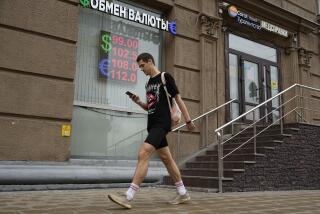Currency Plunges by 40% as Turkey Tries to Stem Crisis
- Share via
ISTANBUL, Turkey — The Turkish currency lost more than 40% of its value Thursday after a political and financial crisis brought on by tumbling stock prices forced the government to abandon exchange controls.
Turkey’s second financial crisis in three months has sent the stock market tumbling, weakened the government of this key U.S. ally in the Middle East and sent jitters through emerging markets from Russia to Brazil.
As the central bank injected $3 billion into the banking system to cushion the lira’s free fall, Prime Minister Bulent Ecevit tried to assure Turkish and foreign markets that the moves would end the country’s latest financial crisis.
“We believe the floating regime will revive the economy in a significant way,” Ecevit said after four days of market turmoil. He insisted that Turkey will continue to carry out anti-inflation measures backed by $11 billion in loans from the International Monetary Fund, although other officials said the program had to be revised.
IMF officials offered cautious support for the end of currency controls, announced at 3 a.m. after a 13-hour Cabinet meeting. Horst Koehler, the fund’s managing director, said the decision “should help stabilize the exchange rate and ensure possibly, after an initial increase, that the inflation rate continues to decline.”
The lira plunged from a value of about 680,000 to the dollar on currency markets Thursday to 960,000 to the dollar.
The Istanbul stock exchange registered a slight recovery, with its main index registering a 10% gain after plummeting 18% Wednesday in its worst single-day loss. Interest rates, which shot up to a dizzying 7,000% on Wednesday, hovered around 700% on Thursday.
Similarly, stock prices in other key emerging markets rallied after diving Wednesday on fears that Turkey’s woes could hurt capital-raising worldwide. Brazil’s main stock index rose 2% and Mexico’s added 0.4%. Russian stocks also rebounded.
Central Bank Gov. Gazi Ercel acknowledged that Turkey would have to revise the targets it had worked out with the IMF for reducing inflation from its current annual rate of 30% to 10% by year’s end.
Western diplomats expressed concern that economic troubles could bring down Ecevit’s three-party coalition and plunge Turkey, a member of the North Atlantic Treaty Organization, into a prolonged period of political instability.
The government’s damaged credibility will make it even harder for Ecevit to push through democratic reforms required by the European Union as conditions for advancing Turkey toward membership in that alliance.
A deeper worry among the country’s pro-Western elite, however, is that the crisis will exacerbate unemployment, playing into the hands of ultranationalists and Islamic zealots.
Facing calls for his resignation, Ecevit, 75, said Thursday he had no intention of stepping down.
Mehmet Ali Irtemcelik, a member of parliament from the conservative Motherland Party, which shares power in the government, termed Ecevit’s resolve “madness.”
Turkey’s largest industrialists’ lobby, Tusiad, issued a statement saying the government is in urgent need of a deputy prime minister “who understands the economy.”
Harsher words came from anxious Turks who stood by the hundreds around exchange houses in Istanbul’s Taksim Square watching the lira sag against the dollar on electronic billboards.
“They deserve to burn in hell,” said Mahmut Sergen, a shopkeeper. “As usual it is we poor people who pay for their mistakes.”
The government’s slowness in overhauling a weak and corruption-plagued banking system and in privatizing debt-shackled state companies is widely viewed as the underlying cause of the crisis.
But the immediate trigger was an extraordinary public feud Monday between Ecevit and President Ahmet Necdet Sezer during a meeting of the National Security Council.
Even the usually unflappable military commanders who sit on the council are said to have been shocked when Sezer accused Ecevit of not doing enough to halt corruption in government-run banks and ministries. Ecevit stormed out of the meeting and accused the president of insulting him and creating a “serious crisis.”
More to Read
Sign up for Essential California
The most important California stories and recommendations in your inbox every morning.
You may occasionally receive promotional content from the Los Angeles Times.













